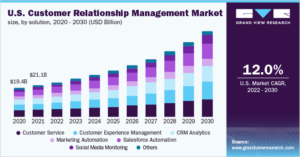Find out how technology can help small businesses grow, from automating processes, and various tools and technology to reaching new customers to drive more sales and grow business very fast. Read on to learn more.
Technology gives all businesses to accelerate fast growth. but tech and tools will be different from sector to sector and depend upon a type of category and requirements. According to a Gartner survey, 56% of CEOs say that implementing digital advancements has increased their business’s revenue and growth.
Best Tech tools for small businesses
All small business has different challenge so choose the right tool for your business and you can solve your problem and save time.
1. Customer Relationship Management (CRM) Software
Any business must have a good customer relationship so the company needs software that can track all customer data and management.
Any new business must need CRM software and must buy this tool. Customer relationship management software is a cloud-based program that allows you to manage business relationships with your customers/Clients as well as future leads.
As per my research, Some of the most popular CRM software programs include Zoho, HubSpot and Salesforce.

2. Email Marketing Tools
Email marketing is an old technique but that is also useful in current business. but currently, we can use a Tool for mass email that can help to track email and record, create follow-up mail, custom time frame mail and other important functions.
A reliable email marketing tool makes your work easier. From designing attractive emails with the help of a pre-built template to generating email reports, tracking and everything with just a few clicks. As per my research, Some of the most popular Email marketing tools for small businesses Convertkit and Omnisend.
3. Workplace Communication Software
Any business must have strong communication for each employee. for modern and digital communication many tools and app are available in the market like Slack, teams, Skype, Whatsapp, etc. and all tool is for text, image and video communication. small businesses have also video communication tools like slack, Teams, skype, google meet and Zoom.

4. Social Media Tools
Social media is essential for any business because, in today’s generation, all people move to social media. so businesses also move to social media and engage all people and grow the business community. for this type of all post, some tools are very useful for an automatic post, schedule post, some templates for any festival, etc.
Social media has presented an incredible opportunity for small business owners to promote their products and service, interact with their target audience, publish interesting content, and build a strong brand image. As per my research, Some of the most popular Social Media marketing tools for small businesses are sprouts Social or Hootsuite.
5. Project Management Tools
Project management software is great if you have multiple task at a time. this type of tool gives you a reminder, meeting time, discussion, video conferencing and all day-to-day word that is important for business. Trello, Asana and Basecamp are a number of project management tools you may also want to look at.
HR Software, Work reporting tools, Cashflow software, Invoicing software, Document management tools, Inventory Management Software, E-Signature Tools, etc These all tools also important for any small business and that depends upon the business type.
6. Knowledge Management Tools
Knowledge management tools help small businesses store their critical company knowledge in a centralized space where it can be easily accessed by employees.
You can safely store your company policies, code of conduct, client details, product and service information on this platform and make it available across the web and mobile devices.
Your teams can work collectively to author content using an online text editor or import articles from existing documents. Each group or user can be assigned a specific role, such as editor, contributor, or administrator, to drive collaborative content creation.
Modern knowledge management software like ProProfs offer a range of pre-designed templates and loads of customization options to help you tailor your knowledge base just the way you want. In fact, you can extend the capabilities of this tool by integrating it with platforms like Slack, Jira, and Disqus.
The ultimate purpose of this software is to foster collaboration between teams and build a culture of knowledge sharing.
Importance of Technology in Small Business
In today’s digital era technology is the best solution for any small business and business. if we digitalized our business then we track our business. with the help of technology, we can easily communicate with customers, operation activity increased, Security, tracking, target and retarget customers, Time and money savers, etc.
1. Communication
with the help of different tools and software, we can communicate with customers within a timeframe. Video conferencing, like Skype and Zoom, makes meetings from across the globe. As for within your organization, an app like Slack or Asana can help you simplify communication within a team. You can use this to track projects, details on tasks, deadlines, etc.
2. Tracking
Track our customer activity and we can target and retarget our customers with the help of advertisements. tracking is an important part of any small business because that can help for business. we can track the start to the end of the cost of any product and service easily.
3. Operational Efficiency
Technology also helps a business understand its cash flow needs and maintain special resources such as time and physical space. Storage inventory technologies let business owners understand how best to manage the storage costs of holding a product. With proper technology in place, administrators can save time and money by holding meetings over the Internet instead of at corporate headquarters.
What is a technology and how does it help small businesses?
The term “technology” describes the devices, procedures, and strategies employed, particularly in the digital era, to accomplish particular activities or goals. Technology may help small businesses in a number of ways, including higher productivity, improved communication, easier access to clients, and lower prices.
The three most crucial details from the response are as follows:
- Technology describes the devices, procedures, and techniques utilized to complete tasks or reach goals.
- For small firms, technology may increase productivity, communication, customer access, and cost-cutting.
- In the digital age, technology has a big role.
What are the benefits of technology for small businesses?
Technology may help small businesses in numerous ways, including cost savings, more accessibility to clients, improved efficiency, and improved communication. Technology can also assist small firms by leveling the playing field so they can compete with larger corporations.
The three most crucial details from the response are as follows:
- Technology helps small businesses operate more efficiently, communicate better, reach more customers, and spend less money.
- Small firms may now compete with larger ones because to technology.
- Small businesses now have access to the resources and tools they need to flourish because to tech.
What are the costs of implementing technology for small businesses?
Depending on the particular technology used and the size of the company, the cost of deploying technology for small businesses can change. Some technological solutions could be expensive upfront, while others might be less expensive upfront but require a monthly or yearly subscription charge. There can also be expenses for continuous maintenance and upgrades, technology customization to match the unique requirements of the company, and training and support.
Here are the three most important pieces of information given in the answer:
- Depending on the technology and the size of the organization, the cost of deploying technology can change.
- Some technological solutions could be expensive up front, while others might be inexpensive yet demand a monthly fee.
- Training, personalization, maintenance, and updates could come at an additional fee.

